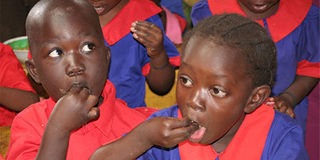No holiday for hungry pupils

Pupils at Siloam Fellowship Ministry Academy in Nairobi’s Kibera eat lunch provided by the World Food Programme. Close to two million such children will be fed at schools during the holidays. Photo/PHOEBE OKALL
About two million children in Kenya's marginal and poor areas will stay in school during the August holiday for feeding.
Various government ministries will coordinate the exercise to ensure the children’s safety and that there are adequate food and water supplies.
Teachers in the selected schools will also be expected to forfeit their vacation to ensure the smooth running of the programme. The decision was reached at a crisis meeting in Nairobi on Tuesday by top education officials.
Severe drought
Speaking to the Press after the meeting, Education minister Sam Ongeri said the government had taken this unusual measure to avert starvation among pupils.
“Sending the children home for the August holiday in areas experiencing severe drought is not tenable as this will expose them to hunger and malnutrition, negating the gains we have made in education and nutrition,” he said.
Prof Ongeri said the holiday feeding programme targeted 1.6 millions of Kenya's nearly eight million primary school pupils.
He, however, said the programme was not compulsory and parents who wished to take their children home could do so.
Schools close on August 7 or earlier.
The plan will target about 4,000 schools in the arid and semi-arid areas and those in slums in both Nairobi and Mombasa. “A recent assessment of the drought situation in the country indicates that numerous households in those areas are experiencing serious food insecurity.”
Families in affected areas have abandoned their homes for neighbouring countries or other distant places in search of pasture and water for their animals.
In Kajiado, for example, 30 per cent of the animals have died and the rest moved to Tsavo West. Prof Ongeri urged the various agencies of government to assist in the programme but welcomed any other help.
“We hope the Water ministry will supply water to the schools in their tankers. I also urge individuals, religious organisations and corporate bodies to support the programme,” he said.
The minister said the Special Programmes ministry would also supply food to schools in places like Kajiado and Laikipia that are not part of the regular programme. Transportation of the food to the districts started this week.
A meal a day
The government allocated Sh1.6 billion for the school feeding programme this financial year. The World Food Programme and the Japanese Government have also thrown their weight behind the programme through the Home Grown School Feeding Programme, which has boosted the number of children being fed by 550,000.
Since 1980, the government and the World Food Programme have been feeding 1.1 million pupils in primary and early childhood centres.
It has been found that schools that provide children with a meal a day register increased enrolment and stable attendance.



